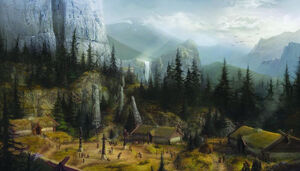
Avvar Village
The Avvars are a human tribe dating back to ancient times.
History
They were one of the tribes of the Alamarri. Although often referred to as a single entity, the Avvars are actually groups of small tribes who operate independently of each other. The only unifying concepts that the Avvars share are their beliefs and culture.
The Avvars fought against the Tevinter Imperium's advances on their land. With the help of dwarves they built the fortresses of Kinloch Hold, and Vigil's Keep. The former became the home to Ferelden's Circle of Magi, and the latter to Grey Wardens, after the Avvar power declined.
Following the First Blight, the Avvars made considerable advance on the Tevinter territory. Maferath, an Avvarian leader married to Andraste managed to conquer most of the Imperium before failing to capture Minrathous, with the help of other Alamarri tribes, and elven slaves led by Shartan. However, after the failed siege of Minrathous, Maferath betrayed his wife and worked out a secret deal with Archon Hessarian. In exchange for truce and the lands south of Kirkwall, the barbarians would give Andraste to the magisters.
The Avvars separated from the Alamarri some time after the First Blight, following a civil war. They took the inhospitable Frostback Mountains of the Alamarri lands to call them home.
By 6:50 Steel the Avvar are united under the great warlord Balak and attack the Bannorn in massive numbers. After two years however, they are pushed out of the Fereldan Valley. This conflict resulted in one of the worst famines in Fereldan history, while the relations of Ferelden with the Avvars remain very sour for centuries.[1]
Culture
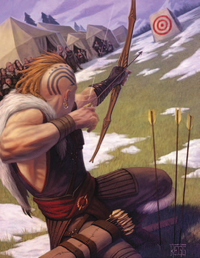
An Avvar Archer[2]
Permanence is a foreign concept to the Avvars. Nothing in the Frostbacks stays the same forever, and nothing in Avvar life is permanent either. Avvar settlements are temporary; their agreements are temporary; even their marriages are temporary. When two Avvars get married, during the ceremony the bride will sing a hymn to a select god while the groom attempts to undo a series of knots in a long rope. The number of knots the groom manages to undo will determine the years that the marriage will last.
Since each Avvar hold is made up of several extended family clans, Avvars often have to marry outside their hold to avoid their relatives. This is seen as a good thing, for it brings in new blood and extends the ties among Avvars. Avvar men go about securing brides by kidnapping them. This is partially arranged in advance by approaching the elders of the target clan and announcing one’s intention. Failure to do so can lead to a blood feud.
Once permission has been given, a warrior is expected to prove his skill by slipping into the hold and removing his new bride. A warrior who is caught on his first try can expect a severe beating, but nothing worse. If he is caught again on the second try, though, he is likely to become lunch for the clan’s sacred animal. Avvarian men may approach a lady directly if they wish to secure her agreement (or assistance), and some Avvar women make it known that they desire a specific man.
Avvars are expected to put loyalty to hold before blood. Even a kidnapped bride is expected to renounce her former ties and cleave to her new clan. Indeed, her old clan and family are forever after slightly suspicious of her, even if she was taken against her will.[3]
The majority of the Avvarian people live in subsistence conditions, with the greater part of their days spent gathering the necessities of survival with little time given over to activities without an immediate practical application. Ornamentation is rare among Avvar-made goods that aren’t religious in nature. They prefer wellmade items that endure the Frostbacks’ extreme weather. The Avvars have a decent relationship with the dwarven kingdom of Orzammar. The Avvars trade furs, goat milk, and free passage rights for dwarf traders (allowing them to travel over the Frostbacks in peace) in exchange for arms and armor. The dwarves regard the Avvars as a useful deterrent against both Ferelden and Orlesian ambitions.[3]
Though their culture has declined over the years, some Avvar clans still exist today. The existing clans live in holds that bear the name of the clan that live there.[4] The Avvars regularly trade with the dwarves of Orzammar in order to acquire fine weaponry and other supplies.[5]
There are three parts to an Avvar name. These are the first name, the byname and the clan name. As Avvar clans are matrilineal, the byname is used to show who an Avvar's mother is. "An" would indicate "daughter of" and "Ar" would indicate "son of". The byname is followed "O" and then the name of the clan. For example, Arcill Ar Dubne O Wyrmhold would be the son of Dubne from the clan Wyrmhold.[4]
Beliefs
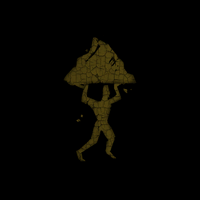
The heraldry of Korth
The Avvars still worship the old gods of the Alamarri, the chief among them Korth the Mountain-Father, Hakkon Wintersbreath, and The Lady of the Skies.[6] Andraste, a barbarian, is said to have prayed first to Korth and the Lady, but her prayers fell on deaf ears until the Maker answered.[7]
The Avvars also worship many lesser gods such as Uvolla, who is the god of the Wending Wood.[8]
It is nearly impossible to speak of the Avvarian people without speaking of their beliefs. Faith is the vibrant cornerstone of their existence, filling their harsh lives with sacred implications, for the Avvars believe as the Alamarri once did: The gods live in all things. Wind from an unexpected direction, birds flying in unusual patterns, a sudden silence amidst the high peaks in the spring—these are nothing but chance to a lowlander, but are messages from the gods to an Avvar.
The Avvars believe without question that their gods have protected them and kept them strong, for do they not thrive despite their numerous enemies? Wise lowlanders avoid pointing out that the hillsmen have been pushed into some of the most inhospitable terrain in all of Thedas. In truth, the Avvars love the Frostbacks and would only take offense at the thought that they were “forced” into the mountains.
The Avvars have a complex pantheon, which includes both nature spirits and legendary mortals who have ascended to the heavens. This is further complicated by the fact that the pantheon varies somewhat from hold to hold, as every clan has its own sacred tales and heroes; however, all Avvars agree on the three greatest gods. These are Korth the Mountain Father, Haakon Wintersbreath, and the Lady of the Skies. Imhar the Clever and the Great Bear Sigfost are also revered is most communities.[3]
The Avvars’ gods are more capricious than cruel, demanding appeasement for perceived sleights rather than wantonly casting misfortune on their people from lofty heights. When Avvars suffer, it seldom occurs to them to blame ill luck, but instead, to wonder which of the gods they have offended. If a warrior suffers a wound, he is concerned that he may have slighted Haakon. If a hunting party returns emptyhanded, their only thought is to placate the Mountain Father; indeed, they will not go forth hunting once more until they have decided on how to mollify Korth - there would be no point in it, as they would surely fail again.[9]
Korth the Mountain-Father
Also known as the Father of the Skies,[5] Korth is the eldest and strongest god and everything found in the mountains stems from him. The Avvars believe all caves were carved by the Mountain-Father to shelter them, and that dwarves are also his creation as they live within his realm, deep underground.[10] It is through his benevolence the Avvars receive everything they need - be it prey for hunters or green fields for goatherds. If game is scarce, Avvars will seek to mollify Korth.
Most Avvars believe Korth is as old as Frostbacks themselves, but the Winter Song of the ancient Frosthold clan tells otherwise. According to this song, which is sung during Wintersend, Korth was a hunter who brought his people to the mountains at the dawn of time.[11] The Avvars return their dead to Korth by leaving them out on the rocks in order to be picked clean by the birds.[5]
The Warden-Commander can interact with a Shrine to Korth located underneath the Vigil's Keep.
Lady of the Skies
The Lady is goddess of all above Korth's domain, of birds and even the wind itself. One legend states that an Avvarian tribe who forsook Korth for the Lady and were rescued from Tevinter invaders by eagles who carried the clan to safety.
She is also goddess of the dead. Rather than cremating their dead as Andrastians do, the Avvars dismember their dead and offer them to the Lady through her messengers, the birds, in what Ferelden scholars refer to as an "air burial".[11]
Hawke can interact with a shrine in the Free Marches, which may indicate the Avvars once spanned the Waking Sea.
Hakkon Wintersbreath
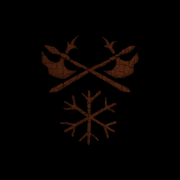
The heraldry of Hakkon
Hakkon is the Korth's firstborn son, and Lord of Winter.[12] He is master of the two bitter colds of frost and steel, and respect for him and his power leads the Avvars to follow him into battle: they prefer to raid and wage war in winter, when their resistance to the cold gives them the advantage over lowlanders.[11]
Sigfrost
The Great Bear sleeps at the foot of the Mountain Father's throne, and is so vast in size that Korth once confused him with a small mountain. Sitting at Korth's foot, he is also the guardian of wisdom. Avvars may challenge him to acquire knowledge, but the bones of many on such a quest are strewn about his den.
Avvars hold all bears sacred and, though they do sometimes hunt and skin them, do so with great solmenity. Due to this, they consider Bereskarn to be especially blasphemous as well.
Several Circle magi claim to have met Sigfrost in the Fade.[11]
Imhar the Clever
The trickster of the Avvar pantheon, Imhar is a slight man who must rely on his quick tongue instead of strength. Avvars enjoy tales of Imhar's jests and mockery, perhaps the most popular of which is that of Imhar and an evil seductress. She lured him into facing her unarmed, then faced him with an army of demons. Playing the coward, Imhar lead them on a merry chase through a mountain pass. When they thought they had cornered him, Imhar laughed out loud. The great noise shook the peaks, and the horde was crushed beneath the avalanche he caused.[11]
Uvolla
A god of the Wending Wood. Little is known of him. He appears to accept living sacrifice, however, in payment for wrongs done in his sacred place.[13]
Avvarian shamans
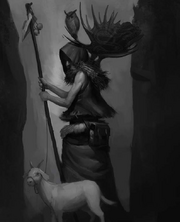
An Avvarian shaman[14]
When forced to consider complex spiritual matters, the Avvars turn to their shamans, the lore keepers of the mountains. It is they who watch the migrations of birds seeking wisdom from the Lady, they who keep the old songs and retain the knowledge of the proper rites to honor the gods and spirits of the mountains. The majority of the Avvars’ shamans are powerful mages whose traditions stretch far back beyond the foundations of the Circle of Magi.[9]
Neither the Chantry nor the Prophetess means anything to the Avvarians, and Templars are not welcome in the Frostbacks. This is wise, as many of the shamans' rituals would horrify the Chantry. Even mild rites invite spirits to speak through the casters for a time, to say nothing of some of their more powerful ceremonies. The Avvars are well aware that some spirits are reluctant to depart human hosts willingly, but they have means of dealing with such recalcitrant entities.[9] After all, they have no more desire to become abominations than other mages, and so their rituals are specifically designed to force the spirits back out as well.[15]
Known Avvar settlements
- Kinloch Hold
- Redhold[16]
- Wyvern Hold[17]
- Fort of a Thousand Vigils
Involvement
The Warden-Commander can meet two Avvars turned into stone in the Wending Wood during the events of Dragon Age: Origins - Awakening.
Furthermore, there is a random encounter in which the Warden-Commander is attacked by a group of Avvars.
Known Avvars
- Anashe, an Avvar tribeswoman and falconer[18]
- Balak, an Avvar warlord[19]
- Disciple Havard, the first of the Disciples of Andraste[20]
- Elorn, Avvar shaman/mage[15]
- Kaelah, a woman who fled Ruadan to find shelter with the dwarves[21]
- Kell ap Morgan, a Jarl of the Avvars
- Kiveal, an Avvar who alongside the dwarves bound The Dark Theurge
- Lowenna an Aenor, an Avvar woman living in Redhold[22]
- Maferath, a warlord and husband of Andraste in the time during the first Exalted Marches[20]
- Morrighan'nan, a chieftan of an Avvar clan[23]
- Ruadan, an Avvarian "shaman" and mage
- The spirit in the Statue of Peace
- The spirit in the Statue of War
- Stiksma, a giant of a warrior[24]
- Thane Owyne ar Rainne, Thane of Redhold[16]
RPG Description
Inevitably encountered only in the midst of winter, unless one happens to be traveling through the heights of the Frostbacks, Avvars are skilled hunters and fierce combatants who exult in battle. They raid into the Fereldan lowlands under the cover of heavy storms, using the great cold to their advantage, as their mountain homes have all but inured them to its bite. Their treacherous homeland has taught them to avoid heavy armor. They prefer strong chain links, dwarf wrought if they can get it, wrapped in warm furs. Avvars favor axes and spears over swords. Their bows are heavy, with long shafts capable of piercing a man’s torso at great distance.
It is nearly impossible to catch a hunting party of Avvars unawares, due to their great skill at falconry. A hunting party will nearly always have a mountain eagle or two, highly clever and well-trained birds that scout for them. Indeed, Avvars are far more likely to ambush others than be caught themselves. The hot blooded Avvars are proud, honorable, and relish any opportunity to prove themselves superior to those they consider to be heretical lowlanders. A clever combatant with knowledge of the Avvars’ ways can try to use either their arrogance or their many superstitions against them.[25]
Related codex entries
![]() Codex entry: The Frostback Mountains
Codex entry: The Frostback Mountains
![]() Codex entry: The Cult of the Sky
Codex entry: The Cult of the Sky
![]() Codex entry: Longbow of the Avvars
Codex entry: Longbow of the Avvars
![]() Codex entry: Notes on the Avvar Sky Cult
Codex entry: Notes on the Avvar Sky Cult
Trivia
- Originally, one of the human origins was going to be an Avvar barbarian.[26][27]
- A glimspe of what life is like for the Avvars can be seen in a scene in Dragon Age: The Calling, where Kell ap Morgan, a senior Grey Warden from among the Avvars, is trapped in a dream of his home.
- In Awakening, the god's name is spelt Haakon.
